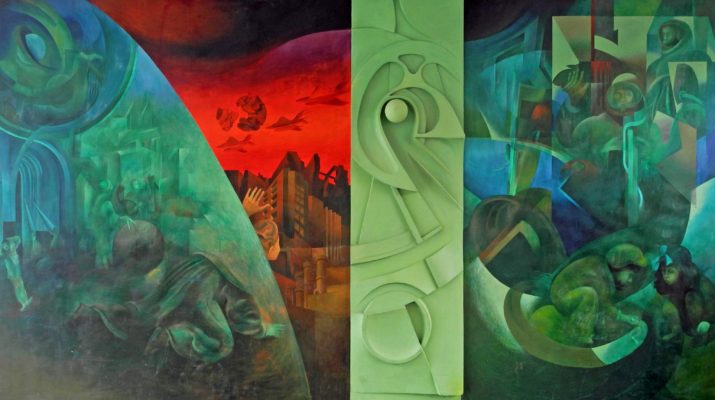Psalm 140
To the leader.I A PsalmII of David.III
I “leader” = natsach. Properly, something that glitters from a distance. So, something that stands out, excels, has status/standing (such as a chief musician or superintendent of Temple services). This can also mean to be permanent or enduring.
II “Psalm” = mizmor. From zamar (making music; used specially of music to worship God; music with singing, singing praise, singing psalms); may be from zamar (to trim or prune). This is a melody or a psalm.
III “David” = David. From the same as dod (beloved, love, uncle); the root may mean to boil, which is used figuratively to describe love. So, this implies someone you love such as a friend, a lover, or a close family member like an uncle. David’s name likely means something like “beloved one.”
1 DeliverIV me, O Lord,V from evildoers;VI
protectVII me from those who are violent,VIII
IV “deliver” = chalats. This is to turn back or away in a literal or figurative sense. So, it could be return, break, build, retreat. It doesn’t necessarily imply going back to the place you started.
V “Lord” = YHVH. From havah (to be, become) or hayah (to come to pass, become, be). This is the name of the God of Israel, the self-existent and eternal one, the tetragrammaton. This pronunciation has been lost to time so “Lord” is generally used in its place.
VI “evildoers” = adam + ra’. Adam is perhaps from adam (to be red, make ruddy); related to adamah (ground, dirt, earth). This is man, humankind, also Adam’s name. It refers to a human individual or humanity. Ra’ is from ra’a’ (to be evil, bad, afflict; properly, to spoil – to destroy by breaking into pieces; figuratively, to cause something to be worthless; this is bad in a physical, social, or moral sense; that which displeases, to do harm or mischief, to punish or vex). This is bad, disagreeable, that which causes pain, misery, something having little or no value, something that is ethically bad, wicked, injury, calamity. This refers to anything that is not what it ought to be – a natural disaster, a disfigurement, an injury, a sin.
VII “protect” = natsar. This is to watch, guard, protect. It can be positive – preserve or obey. It can be negative as conceal.
VIII “violent” = ish + chamas. Ish is perhaps from enosh (human, humankind, mortal); from anash (to be weak, sick, or frail). This is man, husband, another, or humankind. Chamas is from chamas (to violate, do violence, to wrong; implies mistreatment). This is violence, cruelty, damage, wrong, injustice, or unrighteous. Violence implies a wrong done. The term is also used to describe unjust gain.
2 who planIX evil thingsX in their mindsXI
IX “plan” = chashab. This is properly to braid or interpenetrate. Literally it is to create or to wear. Figuratively, it can mean plotting – generally in a negative sense. More broadly, this can also mean think, consider, or make account of.
X “evil things” = ra’. Same as “evildoers” in v1. See note VI above.
XI “minds” = leb. May be related to labab (to encourage; properly, to be encased as with fat; used in a good sense, this means to transport someone with love; used in a bad sense, it can mean to dull one’s senses). This is the heart, courage, one’s inner self, the mind, or the will. Heart is only used in a figurative sense in the Old and New Testaments.
and stir upXII warsXIII continually.XIV
XII “stir up” = gur. Properly, this is the act of turning off the road for any reason. So, it means sojourning, becoming a guest. It can mean being fearful since one is outside of home territory. It can also mean dwelling, living, or inhabiting if one has turned off the root to encamp for a longer duration. This word is where the Hebrew “ger” comes from, which is the word translated “stranger” or “resident alien.”
XIII “wars” = milchamah. From lacham (to eat or feed on; figuratively, to battle as a kind of consumption/destruction). This is battle, war, fighting, or one who fights (i.e. a warrior).
XIV “continually” = kol + yom. Literally, “all of the day.” Kol is from kalal (to complete). This is all or every. Yom is from a root that may mean being hot. This is the day in a literal or figurative sense. It can also mean birth, age, daylight, continually or other references to time.
3 They make their tongueXV sharpXVI as a snake’s,XVII
XV “tongues” = lashon. This is tongue, talker, language, or wedge. It can also be a tongue of flame or a water cove.
XVI “make…sharp” = shanan. 9x in NT– including Deuteronomy 6:7 “recite them to your children.” This is to pierce, sharpen, or whet. It is often used for sharp arrows or being pricked in the heart. Figuratively, it can mean to teach diligently.
XVII “snake’s” = nachash. Perhaps from nachash (to practice divination, learn by experience; to hiss as in whispering a spell). This is a serpent or snake. Used for the Serpent in the garden of Eden.
and under their lipsXVIII is the venomXIX of vipers.XX SelahXXI
XVIII “lips” = saphah. This is lip, edge, border, bank – used for a boundary. It can also be speech or language.
XIX “venom” = chemah. From yacham (to be hot, mate; figuratively, to conceive). This is heat – figuratively it can be anger or fury. It can also refer to poison or venom as they can cause fever.
XX “vipers” = akshub. 1x in OT. Root may mean to coil. This is an asp or adder.
XXI “Selah” = selah. From salal (to lift up, build, pile, extol, exalt; can also be used for opposing as a dam holds back water). This is to lift up or exalt. Also, “selah” in the psalms where its precise meaning is uncertain. It could be a pause in the music, a moment of silence. It could signal a change in the service or mean something akin to amen.
4 GuardXXII me, O Lord, from the handsXXIII of the wicked;XXIV
protect me from the violent
who have planned my downfall.XXV
XXII “guard” = shamar. This is to keep, watch, or preserve. It means to guard something or to protect it as a thorny hedge protects something.
XXIII “hands” = yad. This is hand, ability, power. Hand in a literal sense, but also what one can do or the means by which one does it.
XXIV “wicked” = rasha. This is morally wrong so it refers to someone who is actively bad as wicked, criminal, an evil person, offender, condemned, or ungodly.
XXV “downfall” = dachah + paam. Literally, “make my steps stumble.” Dachah is 11x in OT. This is to push down, drive, thrust, totter, trip, or chase. It can also mean to overthrow or refer to an outcast as one has been pushed down/overthrown. Paam is from paam (to move, trouble; to tap in a regular rhythm; to agitate). This is a beat, stroke, footstep, or occurrence.
5 The arrogantXXVI have hiddenXXVII a trapXXVIII for me,
and with cordsXXIX they have spreadXXX a net,XXXI
XXVI “arrogant” = geeh. 8x in OT. From gaah (to rise up, lift, triumph, be majestic or exalted). This is proud, lofty, or arrogant.
XXVII “hidden” = taman. This is to hide, bury, keep in reserve. It is hiding something by covering it.
XXVIII “trap” = pach. From pachach (to trap, lay a net). This is a snare or bird trap. It can also refer to a sheet of metal hammered into a thin plate.
XXIX “cords” = chebel. From chabal (to bind, pledge, or wind tight; figuratively, can refer to perverting or destroying something; can also be used of writhing in pain, particularly in reference to childbirth). This is a band, rope, measuring line, noose. It can be a company, territory, or country. It can also refer to a throe of labor or ruin.
XXX “spread” = paras. This is to spread or stretch out, extend, break up, chop to pieces, disperse, display.
XXXI “net” = resheth. From yarash (inheriting or dispossessing; refers to occupying or colonizing – taking territory by driving out the previous inhabitants and living there instead of them; by implication, to seize or rob, to expel, ruin, or impoverish). This is a net used to capture animals.
along theXXXII roadXXXIII they have setXXXIV snaresXXXV for me. Selah
XXXII {untranslated} = yad. Same as “monument” in v4. See note XXIII above.
XXXIII “road” = magal. 16x in OT. From the same as agol (round). Older root may mean to revolve. This is a path or course. It is a track in a literal or figurative sense. Could also refer to a rampart because it is circular.
XXXIV “set” = shith. This is to place, set, bring, appoint, consider, bring, array or look.
XXXV “snares” = moqesh. From yaqosh (ensnare, lay bait, lure, trapper; to snare literally or figuratively). This is bait, barb, snare, trap; a noose or hook to trap animals in a literal or figurative sense.
6 I say to the Lord, “You are my God;XXXVI
give ear,XXXVII O Lord, to the voiceXXXVIII of my supplications.”XXXIX
XXXVI “God” = El.
XXXVII “give ear” = azan. Perhaps from ozen (ear, hearing, audience, show; properly, broadness – applied to its ear in reference to its shape). Properly, this is to expand or broaden one’s ear i.e. listen intently, pay attention, heed.
XXXVIII “voice” = qol. This is a sound, used often for human voices. Also used when God speaks or angels, animals or instruments. It can be a cry or a noise, thunder or earthquakes and so on.
XXXIX “supplications” = tachanun. 18x in OT. From chanan (beseech, show favor, be gracious; properly, to bend in kindness to someone with less status). This is entreaty, prayer, or supplication. It is looking for favor earnestly.
7 O Lord,XL my Lord,XLI my strongXLII deliverer,XLIII
XL “Lord” = YHVH. Related to “Lord” in v1. See note V above. It has a different vowel pointing, but the same meaning.
XLI “Lord” = Adonai. From adon (lord, master, owner); root means to rule or be sovereign. This is the actual Hebrew word for Lord used (in a different form) of humans and (in the present form) of God. It means someone who is in control.
XLII “strong” = oz. From azaz (to be strong, become fixed, be bold, prevail, be impudent; it means to be stout literally or figuratively. A Late Hebrew word). This is strength in the sense of force, majesty, praise, material and physical strength, the abstract notion of security. It can also speak of social or political power.
XLIII “deliverer” = yeshuah. From yasha (to deliver, defend, help, preserve, rescue, be safe. Properly, to be open, wide or free, which implies being safe. Used causatively, it means to free). This is salvation, deliverance, health, victory, prosperity.
you have coveredXLIV my headXLV in the dayXLVI of battle.XLVII
XLIV “covered” = sakak. This is to cover or overshadow. It could also be to hedge or fence it. Figuratively, this could be to defend, protect, or join together.
XLV “head” = rosh. This may come a word that means to shake. It is the head, captain, or chief. It can also be excellent or the forefront. It can be first in position or in statue or in time (i.e. the beginning).
XLVI “day” = yom. Same as “continually” in v2. See note XIV above.
XLVII “battle” = nesheq. 10x in NT. From nashaq (to handle, be armed). This is weapon, equipment, a person equipped, an arsenal, a battle.
8 Do not grant,XLVIII O Lord,XLIX the desiresL of the wicked;
do not furtherLI their evil plot.LII Selah
XLVIII “grant” = natan. This is to give, put, set, offer. It is to give literally or figuratively.
XLIX “Lord” = YHVH. Same as “Lord” in v1. See note V above.
L “desires” = maavay. 1x in OT. Perhaps from avah (to desire, crave, wish for, lust after). This is a desire.
LI “further” = puq + rum. Puq is 7x in OT. This is to further, supply, obtain, offer, promote, draw out, succeed. Rum is to rise or raise, to be high literally or figuratively. So it can also mean to exalt or extol.
LII “plot” = zamam. From zamam (to devise, plot, imagine, intend, scheme, think evil; usually in an evil sense). This is a plan or plot.
9 Those who surroundLIII me lift up their heads;
let the mischiefLIV of their lips overwhelmLV them!
LIII “surround” = mesab. 5x in OT. From sabab (turning around, going around; to surround, cast, walk, fetch; to revolve or border in a literal or figurative sense). This is around, surround, couch, change direction, table.
LIV “mischief” = amal. From amal (to work – hard labor). This is trouble, toil, labor as well as misery, sorrow, or iniquity. It is work that wearies through effort so hence worry – can refer to body or mind.
LV “overwhelm” = kasah. This is to cover, conceal, overwhelm. It is to cover as clothes do or to hide a secret.
10 Let burning coalsLVI fallLVII on them!
Let them be flungLVIII into pits,LIX no moreLX to rise!LXI
LVI “burning coals” = gechel + esh. Gechel is 18x in OT. Root may mean to glow or kindle. This is a cot or hot ember. Esh is fire, burning, flaming, hot. It is fire in a literal or figurative sense.
LVII “fall” = mot. This is to shake, slip, falter, stagger, move, fall, give way, waver, be carried.
LVIII “flung” = naphal. This is to fall, whether by accident, to fall prostrate, or to fall in violent death. Figuratively, it can refer to personal ruin or calamity, a city falling, an attack or a falling away. It can also be a deep sleep or wasting away.
LIX “pits” = mahamorah. 1x in OT. This is a watery pit or an abyss.
LX “no more” = bal. From balah (to grow old, wear out, consume, waste, enjoy, fail, decay). This is not, lest, neither. Properly, it refers to a failure, so it implies nothing or not at all.
LXI “rise” = qum. To arise, stand, accomplish, establish, abide. This is rising as in rising against, getting up after being sick or asleep, arising from one state to another, becoming powerful, or rising for action. It can also be standing in a figurative sense.
11 Do notLXII let the slandererLXIII be establishedLXIV in the land;LXV
let evilLXVI speedilyLXVII hunt downLXVIII the violent!
LXII “not” = bal. Same as “no more” in v10. See note LX above.
LXIII “slanderer” = ish + lashon. Ish is the same as “violent” in v1. See note VIII above. Lashon is the same as “tongues” in v3. See note XV above.
LXIV “be established” = kun. Properly, this means in a perpendicular position. So, it is set up in a literal sense – establish, fix, fasten, prepare. In a figurative sense, it is certainty, to be firm, faithfulness, render sure or prosperous.
LXV “land” = erets. Root may mean to be firm. This is earth, ground, field land, or country.
LXVI “evil” = ra’. Same as “evildoers” in v1. See note VI above.
LXVII “speedily” = madchephah. 1x in OT. From dachaph (to drive, hurry, urge). This is speedily or overthrow.
LXVIII “hunt down” = tsud. 18x in OT. This is to hunt, to lie in wait in order to catch an animal. It can be used figuratively for capturing people.
12 I knowLXIX that the Lord maintainsLXX the causeLXXI of the needyLXXII
and executes justiceLXXIII for the poor.LXXIV
LXIX “know” = yada. This is to know, acknowledge, advise, answer, be aware, be acquainted with. Properly, this is to figure something out by seeing. It includes ideas of observation, recognition, and care about something. It can be used causatively for instruction, designation, and punishment.
LXX “maintains” = asah. This is to make, do, act, appoint, become in many senses.
LXXI “cause” = din. From din (to judge). This is judgment – it can include a lawsuit, a sentence, the place where judgment takes place, or justice itself. It can also imply strife or rights.
LXXII “needy” = ani. From anah (to be bowed down; humility or being browbeaten, oppressed, afflicted, or depressed; literal or figurative – depressed in mood or circumstance). This is humble, lowly, poor, or afflicted.
LXXIII “justice” = mishpat. From shaphat (to judge, defend, pronounce judgment, condemn, govern). This is a verdict or formal sentence whether from humans or from God. It includes the act of judging as well as the place that judging takes place, the suit itself, and the penalty. Abstractly, this is justice, which includes the rights of the participants.
LXXIV “poor” = ebyon. From abah (to consent, obey, want, yield, accept). This is needy, poor, beggar. Someone who is wanting.
13 SurelyLXXV the righteousLXXVI shall give thanksLXXVII to your name;LXXVIII
LXXV “surely” = ak. Related to “be established” in v11. Related to aken (surely, truly, nevertheless); from kun (see note LXIV above). This is a positive statement – surely, also, certainly, alone, only.
LXXVI “righteous” = tsaddiq. From the same as tsedeq (rightness, righteousness, just cause, vindication; that which is right in a natural, moral, or legal sense; abstractly equity; figuratively prosperity). This is just, innocent, righteous, righteous one, or lawful.
LXXVII “give thanks” = yadah. From yad (hand). This is to throw one’s hands into the air in a gesture of praise. So, it is to praise, give thanks, or make a confession.
LXXVIII “name” = shem. May be from sum (to put, place, set). This is name, fame, renown. A name was thought to indicate something essential about a person – something about their individuality. So, this word can also mean honor, authority, or character.
the uprightLXXIX shall liveLXXX in your presence.LXXXI
LXXIX “upright” = yashar. From yashar (to be straight, right, even, smooth, or agreeable; figuratively, to make something pleasant or prosperous). This is straight, right, level. Also, it is pleasing, whether pleasing God or pleasing other people. So, it is upright or righteous.
LXXX “live” = yashab. This is to sit and so to remain and so to dwell. It is sitting for any reason – as a judge, in order to ambush, or just sitting quietly. Causatively, this can mean settling or marrying. This can also mean continue, endure, or establish.
LXXXI “presence” = paneh. From panah (to turn, face, appear). This is face in a literal or figurative sense. It could be face, presence, anger, respect. It can also be used of God to indicate divine favor or presence.
Image credit: “People – Technology – Future” by Dieter Bock von Lennep at the Bernhard August von Lindenau Elementary School in Dresden, Germany. Photo by SchiDD, 2018.




